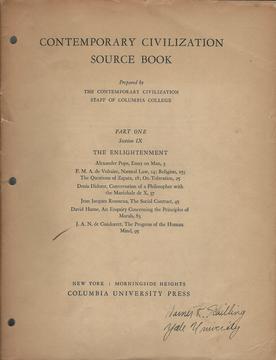Core Curriculum (Columbia College)
Core Curriculum (Columbia College)
The Core Curriculum at Columbia College is a set of common courses required of all undergraduates. It was established in 1919 and is one of the oldest and most renowned core curricula in the United States. The Core Curriculum aims to provide students with a broad foundation in the liberal arts and sciences, fostering critical thinking, intellectual exploration, and a shared academic experience.
History[edit | edit source]
The Core Curriculum was introduced in 1919 as part of a broader educational reform at Columbia University. The initial course, Contemporary Civilization, was designed to address the social and political issues of the time. Over the years, the curriculum expanded to include courses in literature, philosophy, art, music, science, and more.
Components[edit | edit source]
The Core Curriculum consists of several key courses:
- Literature Humanities: A year-long course that explores major works of Western literature from antiquity to the present.
- Contemporary Civilization: A year-long course focusing on significant texts in moral and political thought.
- Art Humanities: A one-semester course that examines masterpieces of Western art.
- Music Humanities: A one-semester course that explores significant works of Western music.
- Frontiers of Science: A one-semester course designed to introduce students to scientific thinking and contemporary scientific issues.
- University Writing: A one-semester course that develops students' writing and critical thinking skills.
Goals[edit | edit source]
The Core Curriculum aims to:
- Develop critical and analytical thinking skills.
- Foster an appreciation for the humanities, arts, and sciences.
- Encourage intellectual curiosity and lifelong learning.
- Create a shared academic experience that unites students across disciplines.
Impact[edit | edit source]
The Core Curriculum has had a profound impact on the educational philosophy of Columbia College. It has been praised for its rigorous academic standards and its role in shaping well-rounded, informed citizens. Many alumni credit the Core Curriculum with providing a strong intellectual foundation that has benefited them in their personal and professional lives.
Related Pages[edit | edit source]
Categories[edit | edit source]
| Columbia University | ||||||||||||||||||||||||||||||||||||
|---|---|---|---|---|---|---|---|---|---|---|---|---|---|---|---|---|---|---|---|---|---|---|---|---|---|---|---|---|---|---|---|---|---|---|---|---|
|
Search WikiMD
Ad.Tired of being Overweight? Try W8MD's physician weight loss program.
Semaglutide (Ozempic / Wegovy and Tirzepatide (Mounjaro / Zepbound) available.
Advertise on WikiMD
|
WikiMD's Wellness Encyclopedia |
| Let Food Be Thy Medicine Medicine Thy Food - Hippocrates |
Translate this page: - East Asian
中文,
日本,
한국어,
South Asian
हिन्दी,
தமிழ்,
తెలుగు,
Urdu,
ಕನ್ನಡ,
Southeast Asian
Indonesian,
Vietnamese,
Thai,
မြန်မာဘာသာ,
বাংলা
European
español,
Deutsch,
français,
Greek,
português do Brasil,
polski,
română,
русский,
Nederlands,
norsk,
svenska,
suomi,
Italian
Middle Eastern & African
عربى,
Turkish,
Persian,
Hebrew,
Afrikaans,
isiZulu,
Kiswahili,
Other
Bulgarian,
Hungarian,
Czech,
Swedish,
മലയാളം,
मराठी,
ਪੰਜਾਬੀ,
ગુજરાતી,
Portuguese,
Ukrainian
Medical Disclaimer: WikiMD is not a substitute for professional medical advice. The information on WikiMD is provided as an information resource only, may be incorrect, outdated or misleading, and is not to be used or relied on for any diagnostic or treatment purposes. Please consult your health care provider before making any healthcare decisions or for guidance about a specific medical condition. WikiMD expressly disclaims responsibility, and shall have no liability, for any damages, loss, injury, or liability whatsoever suffered as a result of your reliance on the information contained in this site. By visiting this site you agree to the foregoing terms and conditions, which may from time to time be changed or supplemented by WikiMD. If you do not agree to the foregoing terms and conditions, you should not enter or use this site. See full disclaimer.
Credits:Most images are courtesy of Wikimedia commons, and templates, categories Wikipedia, licensed under CC BY SA or similar.
Contributors: Prab R. Tumpati, MD



